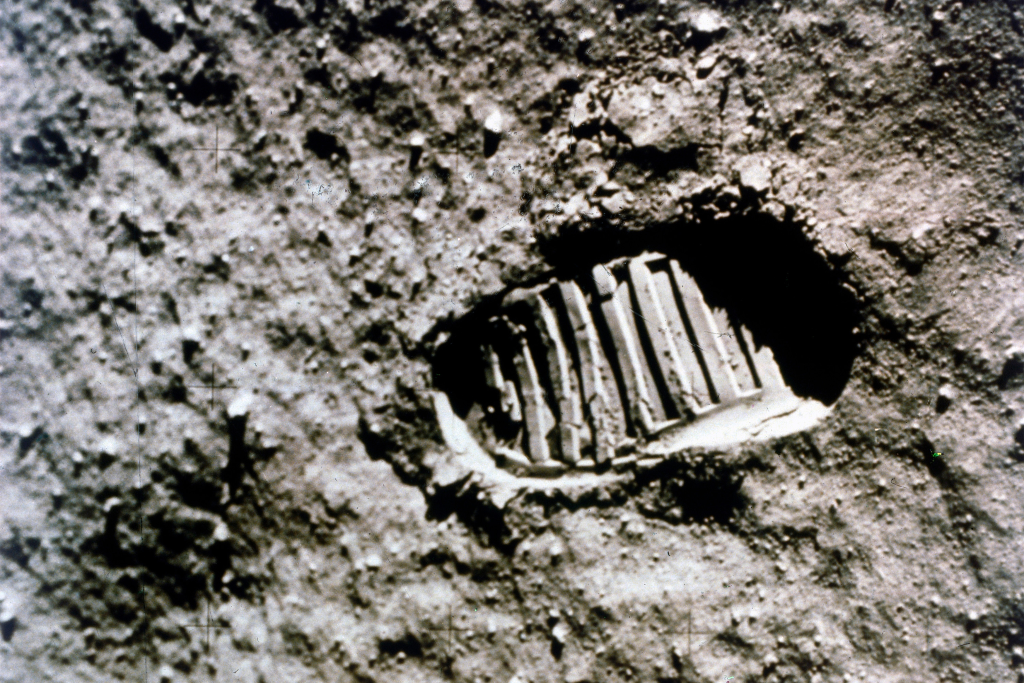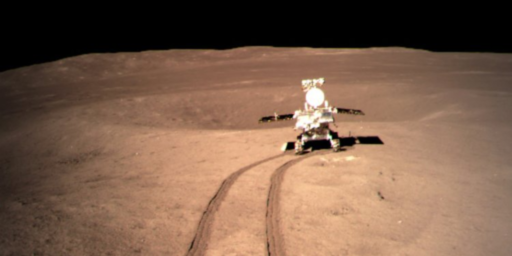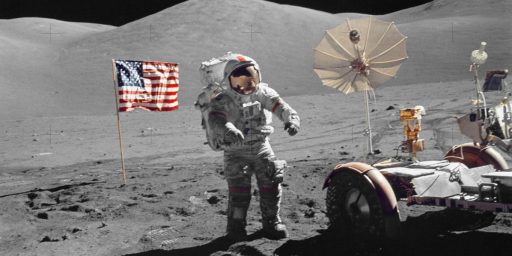Apollo At 50
Fifty years ago today, we were reminded of what humanity can accomplish if we put our minds to it. It seems like we've forgotten that over the past half-century.

Fifty years ago, Neil Armstrong made history as the first human being to step foot on the surface of a planetary body other than Earth. The event came at a particularly tumultuous time in history in which the United States found itself in the middle of a social, political, and cultural battle that shattered many of the preconceived notions of what the world was or should be like that had developed in the two decades since the end of World War II. Just the year before, the nation had been rocked by the twin assassinations of Martin Luther King, Jr.and Rober Kennedy, political leaders that in their own way embodied much of the hope that the counter-culture and the Civil Rights Movement had helped to create. That year before the Moon landing also saw one of the most contentious Presidential elections in modern history, complete with riots at the Democratic National Convention and the election of a controversial President. To top it all off, the nation was engaged in what would prove to be one of its longest and most divisive wars in American history, one that would continue for several more years and lead to the needless death of thousands on both sides.
For one brief moment, though, all of that was pushed to the side. The nation and much of the rest of the world paused in front of television sets to watch the Lunar Lander Eagle touch down on the surface of the Moon and then, hours later, Neil Armstrong walk down the ladder and take those first historic steps. By some estimates, the global audience watching at that time was somewhere in the neighborhood of 500,000,000 people and, for that brief time, they were given a glimpse of what humanity could accomplish by working together. As Armstrong said, it was one small step for (a) man and one giant leap for mankind.
Over the past fifty years, there has been plenty written about what the events of July 20, 1969 meant, and what we should have learned from them but largely didn’t. Most of those writers are were far more eloquent and insightful than I, so I won’t attempt to top them. At the same time, though, in retrospect, it’s clear that those events showed us the best of humanity, what we can accomplish by working together, and the extent to which the problems we were facing then, or the ones that we face now, are minor in the grand scheme of the universe and that our future lied not in the divisions we create back home, whether they’re racial, ethnic, religious, sexual, or whatever you can think of, but out there among the stars. Somewhere along the way, we lost focus on that and returned to the old ways. It’s not surprising, really, humanity has been dividing itself into artificial groups for millennia and pulling away from that impulse goes against eons of behavior that is, sadly, probably baked into our DNA at this point.
On some level then, it’s probably appropriate that the 50th anniversary of that historic moment is coming when it did. The similarities between America today and the America of the late 1960s are hard to miss. Now, as then, we find ourselves a nation at war not only overseas but also internally. Political division and distrust are the defining sign of our times just as they were when man first stepped foot on another world. Internationally, existing and threatened wars seem to exist at every turn. Now, as then, we find ourselves led by a controversial President, although as a reminder that history repeats itself as tragedy followed by farce, today’s leadership makes even Richard Nixon seem calm and reassuring by comparison. Every day seems to bring bad news, and concern for what the future may bring.
As we pause today to remember the events of July 20, 1969, perhaps it would do us some good to remember the lessons we should have learned 50 years ago. It doesn’t have to be this way. We don’t have to keep dividing and fighting amongst ourselves over things that, in the grand scheme of the universe, mean little to nothing. If we would just focus our attention, we can accomplish anything, just as we put men on the Moon less than a decade after President John F. Kennedy had made that promise. He didn’t live to see that happen, unfortunately, we probably won’t live long enough to see the greatness that we can achieve but that doesn’t mean we can’t remember the lessons of Apollo 11, reach out beyond the confines of our pale blue dot, and remember that in the end what unites us is far more important than what divides us.
YouTube permissions don’t allow embedding but at the link there’s something special, an interview that Walter Cronkite conducted with Arthur C. Clarke and Robert Heinlein in 1969 about the Apollo 11 landing and the future.
Here’s video of the final 40 seconds of the descent of the Lunar Lander onto the Moon’s surface:
And here’s video of Armstrong’s first steps on the Moon:
Here’s CBS Radio coverage of the landing:
Finally, here’s Walter Cronkite’s coverage of the events of July 20th, probably the best known of all the reports. It is estimated that more than half of the 57 million televisions that were in American homes at the time were tuned into his coverage of the events of July 20, 1969:






Somewhere along the way, we lost focus on that and returned to the old ways
By design, I’d argue. It’s taken a lot of effort by our political leaders, around the world, to ensure that spaceflight hasn’t much affected the status quo. But look at the benefits! Italy isn’t sparring with France over dividing titanium-rich deposits on the Moon. There’s no Chinese province in the asteroid belt crowding new embryonic American states, no race between explorers seeking the best spots for retirement communities on Venus, no Martian Free State clamoring for representation in the United Nations. No squabbles between Republicans and Democrats about who failed to maximize American interests in the satellites of Jupiter, no unruly demonstrators condemning Congress for looking after the interests of astronauts rather than poor people, no bankers leaping from Wall Street windows because dirt cheap gold and platinum has ruined the values of their deposits, no dispossessed farmers or urban wage slaves dreaming of starting better lives on other worlds, no arrogant engineers and college adjuncts disputing the superior social status of lawyers and stock brokers and inheritors of wealth. Ordinary people are still in their place. The world as it is is just perfect!
Tranquility, base. The Eagle is grounded.
As someone who’s enthusiastic about space exploration, I wish I could be happy about this anniversary. Rather the opposite is true.
Arthur C. Clarke compared the short period of Lunar exploration of the Apollo program to the race to the South Pole at the dawn of the XX Century. The place was reached in 1911, then left alone until 1957.
Larry Niven had a more sardonic take: If we can put a man on the Moon, why can’t we put a man on the Moon?
It m,ostly comes down to cost. Per Wikipedia Apollo costs, adjusted for inflation, came to around $153 billion, without including the Gemini program, or the robotic landers that preceded it.
That is a huge amount of money, even spread over 12 years or so, and the root of the complaints about being able to put a man on the Moon (BTW, a total of 12 men walked on the Moon), when the money might be better spent elsewhere.
The other thing it comes down to is lack of interest. How many people, I wonder, even know Apollo XI wasn’t the only exploration trip to the Moon?
In the movie Apollo XIII, we’re told enthusiasm for the mission is down compared to Apollo XI, that a broadcast from the spacecraft en route to the Moon is not shown live on TV. Also that the mission wasn’t in the front pages until the oxygen tank blew in the service module, and the astronauts’ lives were placed in danger.
I don’t know if that’s true or not, but it rings true. I recall the first Shuttle launch was carried live in several networks, as was the first landing, but subsequent fights received much less coverage.
It’s too bad there was never any real follow-up to Apollo. Robot probes are much cheaper, but actual humans standing in another world are far more inspiring.
@Kathy:
Your mention of Arthur C. Clarke reminded me of something I’d watched on YouTube earlier this week, an interview that Walter Cronkite conducted with Arthur C. Clarke and Robert Heinlein about the Moon landing and the future. I also added the link to the post.
The rest of your comments are well taken. I’ve talked about the advantages and discoveries of the unmanned program many times. That being said, I think that there will always be a need and a desire for humans to go see (and do) things for themselves. At some point, we’ve got to get the heck off this rock.
@Kathy:
It’s true.
@Doug Mataconis: Using Kathy’s figures of $153 billion and 12 astronauts the cost per man on the moon was $12,750,000,000. If we had sent more the cost per astronaut would have dropped considerably but what more would they have accomplished? A permanent presence on the moon? To what end? Their early deaths from cancer due to unshielded radiation?
As one who grew up neck deep in sci-fi, I love the idea of space travel, the ‘romance’ of sending men and women beyond the limits of knowledge, but the reality is it is very expensive and not at all practical.
@Doug Mataconis:
I tend to think about the Concorde when I think about Apollo. Not only do they date from the same era(*), but both were also rather limited.
Back then, people thought lunar bases or even colonies were near, and that supersonic flight would dominate travel. What we got was a science lab in low earth orbit and subsonic widebody jets.
I agree, but it’s important to understand how expensive and difficult that will be. Me, I don’t expect a manned voyage to Mars in my lifetime. It would be too expensive, for one thing, and the risks are not fully known.
(*) Concorde first flew in March 1969, though it didn’t enter service until the mid-70s. Coincidentally, the Boeing 747 first flew in February 1969.
Funny how a Cold War rivalry with the USSR generated plenty of that interest…
Apollo was a one-off engineering problem, narrowly defined, with a solution that could be extrapolated from where we were when we started. Throw-away solutions were acceptable. There was a biggish pile of money to throw at it as the debt from WWII had been largely retired. And there was a big final blowoff (in the carny sense).
Current 20-billion-transistor processors were arguably a harder technical problem. The ubiquitous internet is arguably far more life-changing for far more people than Apollo. Fusion power plants can’t be simply extrapolated from where we are now. Global climate change has a simple solution — make the electric grid carbon-free, then electrify everything — but there’s a lot of personal pain involved. At the end of one of the great economic booms in history, we are borrowing a trillion dollars per year. And all of those problems lack the big throw-away blowoff.
Good grifters, in private industry or government, have always recognized Americans’ fondness for the big blowoff.
Having attended this year’s ISDC, I think we’re seeing a resurgence and a lot of enthusiasm. We’re also finally seeing more commercial space development involving humans.
A lot of space development is like nanotechnology–as soon as it gets done, it isn’t considered space development/nanotechnology any more. Environmental and communication satellites are now taken for granted and considered routine.
@OzarkHillbilly:
Well, there were three more Moon landings scheduled, Apollo 18, 19, and 20, which were canceled. Plus Apollo XIII, which aborted the landing to save the crew.
There would have been the added costs of more hardware, plus all the operational costs from fuel to the salaries of everyone involved in preparing and carrying out the missions.
At that, two whole Saturn V launchers were left over, plus the third stage of another one (the one used to launch Skylab).
There was a proposal to land an Apollo mission on the far side of the Moon, but that would have required a relay satellite in Lunar orbit to allow the crew to stay in touch with Earth.
So not much, perhaps, beyond more samples of lunar rocks and soil, which would be valuable scientifically but not crucial given already existing samples. BTW, with 382 kilograms of samples returned, they cost $400,523,560.21 per kilo, making them by far the most expensive rocks and
dirt ever.
The thing isn’t so much that there is no ongoing lunar exploration, or no manned trips to Mars or the asteroids, but that there is no permanent, expansive, self-sustaining (or even partially self-sustaining) human presence in space by now.
There’s a novel by Arthur C. Clarke called “Islands in the Sky,” not a good one, which takes place almost entirely in space stations orbiting the Earth. Clarke imagined all the useful functions satellites provide today, like telecommunications and weather watching, would be performed by people in space stations, as he didn’t think electronics would be reliable enough to be left largely unattended.
As of today, the money that’s to be made from space is between low Earth orbit and Clarke orbit (the man knew whereof he spoke). But electronics are reliable enough to work unattended. So people will pay money to build and launch satellites because they can make money off them, or in the case of governments because they serve a useful function.
@Michael Cain:
this is so politically/economically impossible that it won’t remotely happen in time. We’re accelerating the amount of carbon we’re adding to the atmosphere.
@Kathy:
Yes, there would be additional costs, but I was speaking specifically of the sunk costs of the Mercury, Gemini, and the early Apollo missions, all of which were with the expressed purpose of putting a man on the moon. A mission accomplished with Apollo XI.
Yes, and there are reasons for that:
#1: $$$$$$$$$$$$$
#2: Suicide
ETA again, I love the idea of it, but recognize the enormous impracticality of it.
When asked to name by-products of the US space program that have affected everyday life, people often talk about relatively unimportant things like Teflon and Tang.
As best I can tell, the most economically and socially important civilian by-product of the Mercury-Gemini-Apollo programs was safe food.
At the outset of the program, the US food industry told NASA that there was literally no technology available to guarantee with reasonable assurance that the food sent to the moon with an Apollo mission would not make them all sick, with catastrophic results. A joint military, NASA, and industry team invented an entirely new food safety process, based on the “critical control points” methods used by NASA for engineering design problems.
That process, somewhat evolved over time, is now mandatory for all food products consumed in the US and in many other countries.
You could make a good case that the space program paid for itself through just that one innovation.
@DrDaveT: Yes, but….. That’s not why we went, and #2 it was an unintended consequence.
It is why I am all in favor of basic research despite so many conservatives being against it. Funny fact: One of Senator Proxmire’s Golden Fleece awards went to a study involving the anal temperatures of Alaskan sled dogs in winter. That data actually had an important impact on the design of space suits.
@OzarkHillbilly: Proxmire was such a dumb demagogue.
@DrDaveT: Some have said that the whole Earth ecology movement wouldn’t have gotten started except for this photo.
@Teve: A true “horse’s ass”.
I was 23 at the time. America was in tatters, losing a war, riots in our cities, iconic people shot down in public. But we were able to rise above it. We were able to bring our real heroes to do truly great things. We, Americans, humans all over the world can do great things. We need leaders who appeal to the best in us not the worst in us. JFK and LBJ had a 1001 failings, but they got us to the moon. Let’s not let ourselves to be dragged down.
The Onion is on point, as usual:
Real Buzz Aldrin Spends 50th Straight Year On Moon Trying To Signal Earth To Warn Of Imposter
@OzarkHillbilly:
There’s an old universal rule on that subject — at any moment in time, there are more equine hindquarters than forequarters.
@OzarkHillbilly:
The almost literal death and taxes of space travel, eh? 😉
The price will stay high for a long time. It’s inevitable given the energies and the complexity involved.
The risk of death from radiation is even more complicated, but not inevitable. If we were to set up colonies on the Moon, for example, building them underground would provide protection from radiation (and small meteorites as well).
I expect such problems will be solved in the future, given enough interest and the incentive to do so. AS yet, the incentive is slight, as I’ve noted before.
@Moosebreath: Heh.
@Kathy:
They would provide some protection, as one would have to come up to the surface just to get around.
People talk about ‘permanent’ space colonies as tho they could and would be self sustaining, that not only would they be able to manufacture any needed equipment, but also grow all their food and mine their own water etc etc, even have children. Never mind the difficulties of all the rest, I read an article recently that opened my eyes to how problematic that last proposition is. I had never even thought about it but several experiments have been done on mammalian reproduction in low gravity environments and they have not been encouraging, which really isn’t all that surprising when one considers that mammals have been engineered to make babies in this particular 1 G, low solar radiation environment.
@grumpy realist: “Environmental and communication satellites are now taken for granted and considered routine.”
Let us take a moment to remember that Jerry Brown was named “Governor Moonbeam” because of his insane prediction that we’d be using satellites for communication in the near future…
A trip through Cape Canaveral leaves one awestruck at the size of Saturn V rockets, the Vehicle Assembly Building, and the Crawler. Then there’s the historic launching pads, the mission control room, and Armstrong’s office.
If the moon landing were today, here’s what we would be talking about – not the mind blowing historic technical achievement – rather:
1.) Why is everyone a Caucasian male? Just another example of paternal, white privilege misusing government funds for ego driven/pe nis driven race to the moon between white leaders of two white countries while many people of coloar in our country go with healthcare.
2.) Why were the Johnson Space Center engineers waving the American flag after the landing? Don’t they know it is a symbol of a racist, gender denying, corrupt society. They should put down those dirty flags in shame.
3.) What was up with Apollo 8 serving up the quote from Genesis? Just proves that Christian America hates any other religion as they beamed this bigoted Bible bile to hundreds of millions on CHRISTMAS eve!!!!! Hello, has NASA ever heard of separation of church and state?
4.) After splashdown, on the Hornet, instead of kissing up to Nixon, why didn’t the spineless astronauts condemn him for the bombing in Vietnam, his crackdown on student protests? Sure, they may be heroes in space but they are political cowards for even paying attention to tricky Dick Nixon.
Did I miss anything….(except of course the many thumbs down I will receive)
@the Q:
Yes, if it happened today, Nixon would be far too dead to be involved in it.
So would Neil Armstrong, BTW.